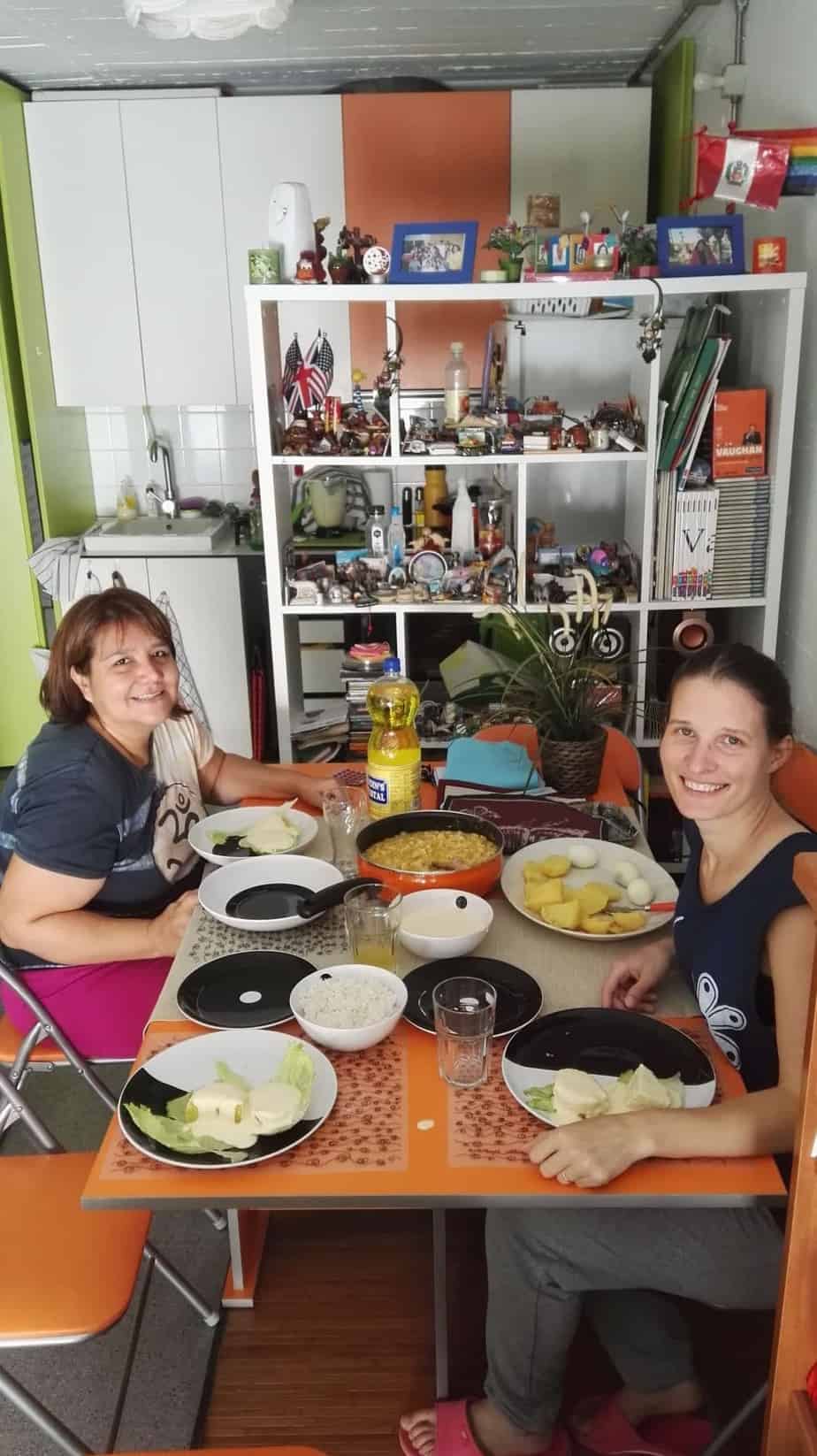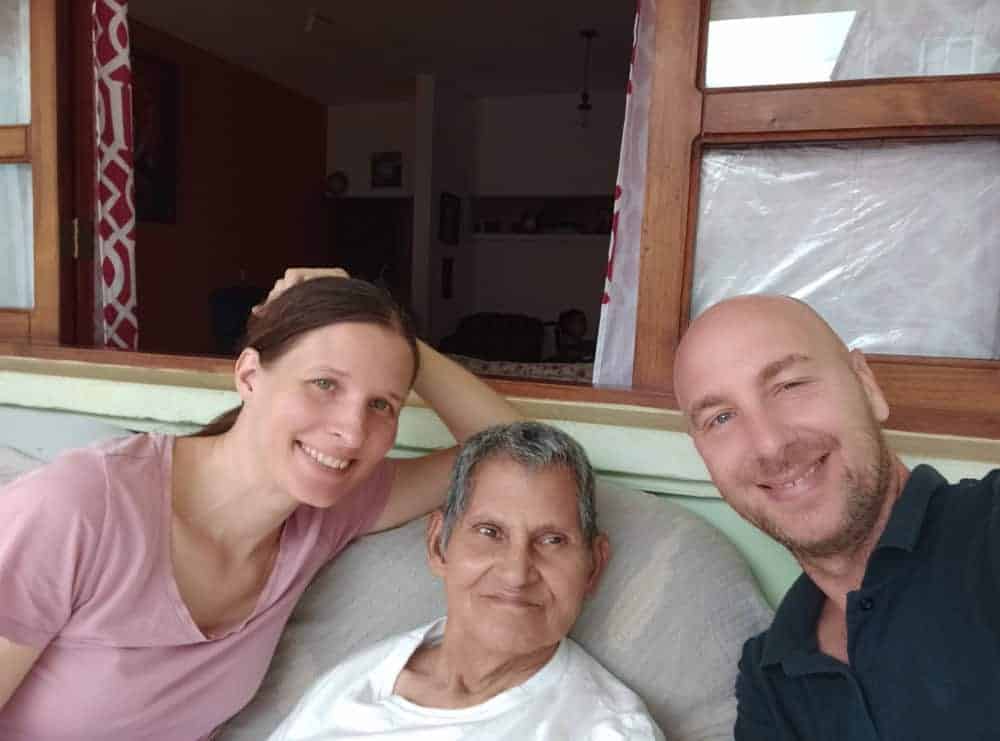We arrived to Madrid. We traveled form Villena to the capital of Spain with two girls, who live in Madrid but were in Villena to attend an important feast.
Feast of Moors and Christians

We arrived in this small town when the Fiesta de Moros y Cristanos (Feast of Moors and Christians) was at its peak. This annual celebration lasts from 4 to 9 September and is dedicated to Our Lady of Virtues (Nuestra Señora de las Virtudes), the protector of the Villena.
The locals were dressed in costumes, cheerful mood prevailed until the early morning. We were too tired to join the crowd, so we swiftly left to say hello to our beds.
Five days with Lucia

In Madrid by using Airbnb, we rented a room and hoped to find an appropriate community or charitable organization soon, so we could join them as a volunteers.
We were staying slightly outside the historical center, the street was named by General Ricardos, but still locatesd withing populated area of Madrid and with good transport links.
Lucia, the girl who hosted us was a very pleasant host and made sure that we could accommodate and have everything necessary for our writing and research.
The girl was just completing her master’s thesis at the University of Madrid, and therefore did not have much time to socialize and talk, but we nevertheless exchanged some interesting thoughts on contemporary philosophy and religion.
Betel – restoring broken lives

Me and Silva also had a clear mission to accomplish. We got to work straight away.
First organization we visited is called Betel. It is an international evangelical community, whose main mission is to help drug and alcohol addicts. As their slogan says: Committed to restoring broken lives.
International community
Betel is present in more than one hundred cities in 24 countries around the world. Its beginnings date back almost thirty years ago, when the urban district of San Blas in Madrid, a small group of Protestant pastors started taking care of local drug addicts and other marginalized people.
Betel’s headquarters is also situated in Madrid and as we found out, not so very far away from our residence, so we could visit them by foot. We walked into a modern and spacious building, where certain pastor friendly acommpanied us to the first floor. He went into the office to find the appropriate person for us to speak with.
Judy
Judy Patterson came out of the office, a New Zelandin, who was here as a missionare. A second english-speaking person was pastor Eliot, who was responsible for the whole community. Back then, pastor Eliot was located in USA so we could only speak to Judy.
In short, we presented her the Operando project, explained her that we were looking for a community, showed her our blog, explaining that we regularly publish new contributions and write about our trip and communities where we stay and collect funds. Then we were shown around to see the Betel Center and Judy explained us in detail the way Betel operates, together with the principles for which they stand for.
Independant of the government and donations

Of all the things I thought the most interesting was the fact that in almost 95% they are being financed by themselves and thus do not depend neither on donators nor on any governmental assistance. How do they manage it?
They are entrepreneurial. Inside the center, they own a dentist for example, a dental clinic not only for members of the community (addicts and employees), but also for people from the outside, that being avialable at significantly lower price than other dentists in the area.
They have their own restaurant, a bakery, Cafe (not serving alcohol) and a wide network of stores, which sell everything from second-hand furniture (usually donated by people) to old items, clothes and shoes at ridiculously low prices.
Betel’s mission
All this brings a significant portion of the income to help carry out its basic mission: setting up new churches and communities, helping addicts to change their way of life and become active members of the community, perhaps even as pastors.
Then she invited us to lunch in their dining room, where members of the community dine as well. At our farewell we were promised to be in contact once a decision by pastor Elliot is being made based on her presentation of our project.
Franco’s legacy
Leaving Betel we had a good feeling. We would like to work in the community with recovering addicts. Drugs are one of the major problems in Spain, especially in large cities such as Madrid and Barcelona.
The regime of the dictator Franco in Spain, as they say here, left behind a true social, moral and spiritual destruction. Therefore, we would be so much happier to contribute in this field.
However we did not want to stop here. We wanted to visit at least one more charitable community in Madrid.
Lucia told us about the Catholic organization Mensajeros de la Paz (The Messangers of Peace), which was founded in Madrid by Padre Angelo.
Mensajeros de la Paz

Father Angel Garcia Rodriguez is one of the more well-known priests in Spain. His organization, which is primarily dedicated to people from the street and all other socially disadvantaged individuals and families, has managed to expand throughout Spain and beyond.
As Father Angel travels a lot, we did not manage to meet him at the headquarters of the organization. So we presented the project to the person responsible for contacts with the public and volunteers.
With enthusiasm she was listening about the idea, about our journey, about how we visit communities and about our volunteer activities and donations by contributing along with blog readers and friends of Operando.
Same as before, we returned home with a good feeling after this meeting. Now we could only await the responses and prepare ourselves for the work.
A challenge on our path
One of the challenges in our way is the search for accommodation. Of course, cheap hostel can be found anywhere, but in fact we wish to find accommodation within the organization or community where we help out.
This way we can stay in better touch with community and the work is near, so we need not spend money on transportation means.
If an organization does not have hospitality capacities, then of course we’re looking for staying opportunities elsewhere. In Paris we were lucky, because we had the Slovenian Catholic Mission at our disposal for free stay as long as we were located in France. When we wanted to contribute at least some money for their accommodation, we were given a response as follows:
‘Let the money go to the ones who need it more than we do. It is true that we do carry some costs for the accommodation, however we believe that God takes good care of us!’
Rejection as part of the way
After such hospitable gestures you probably understand our disappointment, when both these organizations did not find the interest to participate, let alone to accommodate us. We could hardly understand their kind of sloppy answers as this way of cooperation is not part of established routines in their organizations.
Pastor Elliot even replied that he does not see any sense in Operando donating money, as Betel is largely self-funded.
Silva and me could do nothing but shrugg and thought about our next step. The fact is that we could not afford to stay in rented apartments for an extensive time. On such a long journey, we have to be very prudent with the money at all times and spend it most rational.
Back to Barcelona

In Barcelona we had Roxana. Do you remember our host friend, about which I wrote in a previous post? We became good friends with Roxana and before we left Barcelona to Madrid, she said that she would be happy to host us again if we needed any help. Maybe it is now time to turn to a friend!
After about a week of stay in Madrid we decided to go back to Barcelona in seek of new communities. There are many charitable organizations and we were confident that we would much easier seek for a place to be if not being burdened too much by the cost of stay.
A search is on
So, we are now back in Barcelona, full of drive to find opportunities to volunteer. Roxana is an excellent host and a great listener. She has been telling us a lot about Spanish culture and character.
When once I asked her at lunch how she sees the biggest difference between Peruans (Roxana is a Peruan) and Spaniards, she did not hesitate to reply:
‘It seems to me that the biggest difference is in hospitality. In Peru and Latin America in general, people quickly adopt you and they offer you everything they have. They open the door of their house and you become one of them. In Spain it’s different. People are more suspicious, it is more difficult to gain a real friendship and the relationship. It can sometimes take several months or years before they invite you into their home for a meal.’
Spanish culture and national customs are largely still a mystery to us and we cannot create our opinion on a basis of this single belief. In any case, we would want to explore it much better!
Nace Volčič



